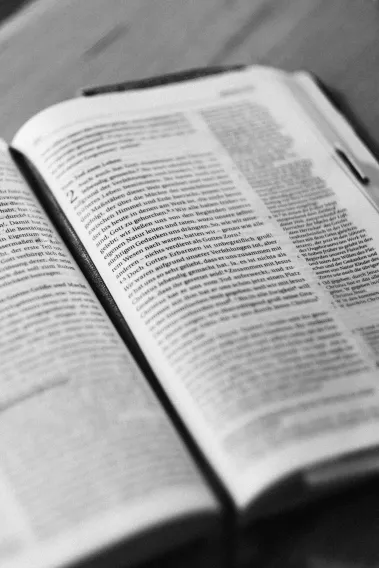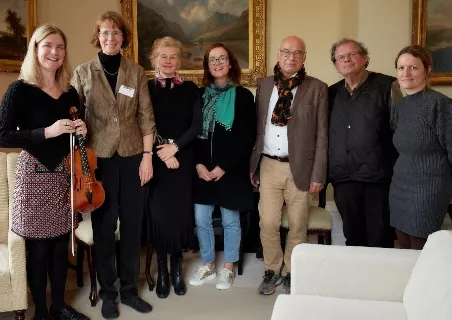Launched in 2021, the translational poetry project Dánnerstag was arguably one of the most integrative projects we have had over the last years, bringing together German poetry readings with their translations into English and Irish.
Funded by the German, Austrian and Swiss Embassies, the DAAD and, in part, by Foras na Gaeilge, the project aimed to explore and deepen the cultural and linguistic links between Germany and Ireland publishing subtitled videos of poetry readings online on our website.
The project’s name Dánnerstag is derived from the Irish word ‘dán’, meaning ‘poem’, and the German word ‘Donnerstag’ (‘Thursday’).
Having seen a delightfully diverse array of contributions, the project continued to introduce a new contemporary poem, read by its author, every month since its conception before finally concluding in May 2022.
Alongside these were recitals of classical German poems read out by various members and friends of the Centre.

2022's contributions featured Semier Insayif’s poem ich dir (January), Kerstin Hensel’s Meine Welt (February), Gabrielle Alioth’s Bitte (Achaini) in March, Nadja Küchenmeister’s Staub (April) and René Böll’s Cilliní to mark the finale of the programme.
All of these videos, including the classical readings, are free to watch online. With the support of Foras na Gaeilge, the Directors of Dánnerstag Prof Gisela Holfter and Dr Sorcha de Brún were very happy to announce the launch of the follow-up project Féile Dánnerstag in the autumn semester.
Foras na Gaeilge’s funding of the project was significant in the context of Irish-German studies as well as in the burgeoning fields of literary translation and literary studies. In contrast to the first manifestation of Dánnerstag which comprised the translation of German poetry to Irish (and English), Féile Dánnerstag had as its primary objective the translation of contemporary Irish poetry to German and English.
In addition to the multilingualism which is of intrinsic importance to the Féile Dánnerstag concept, all four poetry events for Féile Dánnerstag were staged and performed in the University of Limerick from September through to December, starting off with the personal and evocative poetry of Gabriel Rosenstock and his translator Hans-Christian Oeser as a pre-programme to our 25th Anniversary Conference on September 22.

Subsequently, Féile Dánnerstag hosted poetry events with Prof Alan Titley, Julie Field (aka Julie Goo) and Micheál Ó hAodha.
On October 11, Professor Alan Titley read a selection of poems to students and staff in the congenial surroundings of the Board Room in Plassey House.
A renowned scholar of modern Irish, Prof Titley’s Irish language poetry and English translations ranged across a selection of topics, encompassing themes such as global politics and highlighting the potential of poetry to give a voice to the powerless.
German translations were by Dr Angelika Hansert, a lecturer in the European Studies Programme in the University of Limerick. Féile Dánnerstag Number Three took place in the atmospheric surroundings of Theatre 1 of the Irish World Academy when Irish language, singer and spoken word/slam poet Julie Goo (aka Julie Field) performed her work to original tracks by DJ Mike Milis.
A joint event and collaboration between the Centre for Irish German Studies, the Centre for the Study of Popular Music and Popular Culture and Aonad na Gaeilge, stage design played an important part in this Féile Dánnerstag event, where a variety of lighting was used for each of Julie’s poems to fully realize the emotional and performative aspect of this artist’s work and to compliment the funky music of DJ Milis.
Members of the Centre for Irish-German Studies read the poems in German translation to an enthralled audience of staff and students, among them Dominik Kohl, Prof Gisela Holfter, Dr Marieke Krajenbrink and Dr Sorcha de Brún.
Translations into English of Field’s poems were by Dr Sorcha de Brún, and German translations by Dr Angelika Hansert. Julie’s performance at Féile Dánnerstag concluded with a thought-provoking interview with questions by Professor Eoin Devereux of the Centre for the Study of Popular Music and Popular Culture.
The final instalment of the Irish-German poetry festival on December 1 saw the festival and its faithful followers return once again to the halcyon environs of the Board Room, where poet and translator Dr Micheál Ó hAodha of the Glucksman Library read his poetry in Irish and English.
Ó hAodha’s moving poems on life and loss were followed by Prof Gisela Holfter’s readings of Eva Bourke’s excellent German translations, a sparkling performance from Dr Diane Daly and student Anna Mitchell, and singing in Irish from Dr Sorcha de Brún.
As described by funders Foras na Gaeilge, Féile Dánnerstag was a “resounding success”, and an example of the outstanding academic collaboration for which CIGS is known and which is consistently moving the field of Irish-German studies forward.
We wish to thank all collaborators and especially Aonad na Gaeilge, Ciara Considine and Dr Deirdre Ní Loingsigh for their ongoing support of Féile Dánnerstag.
We hope to build on this wonderful success and continue with the project in some form next year, so watch this space for further news! Go raibh míle maith agaibh go léir!